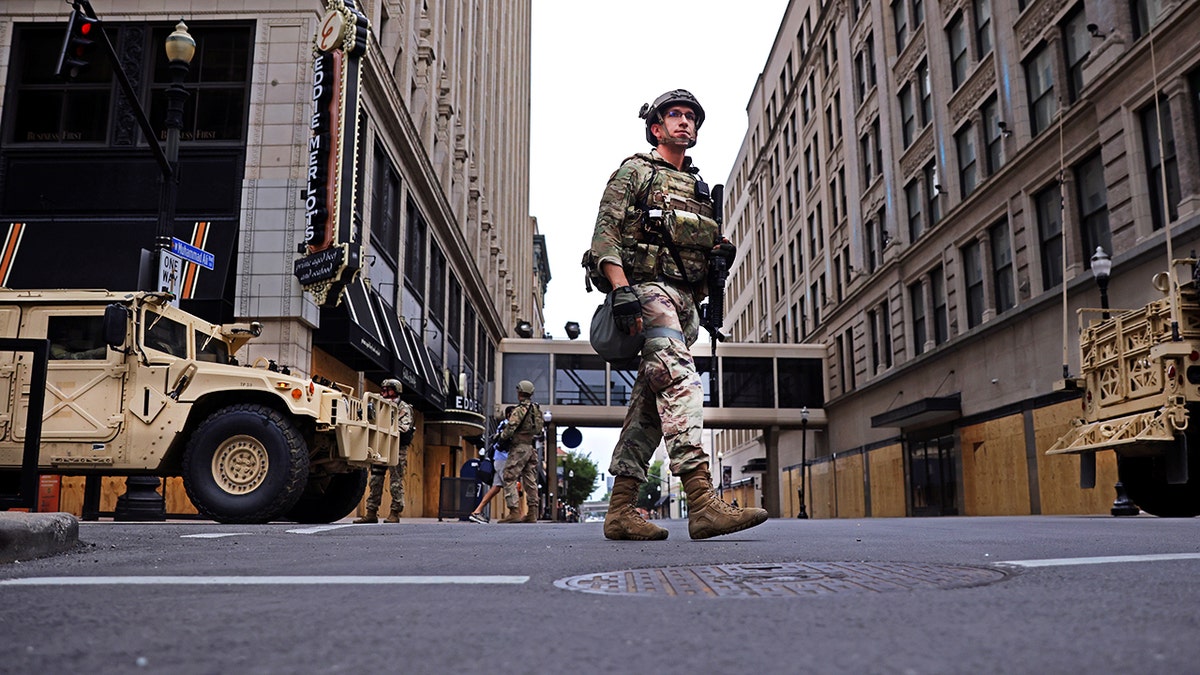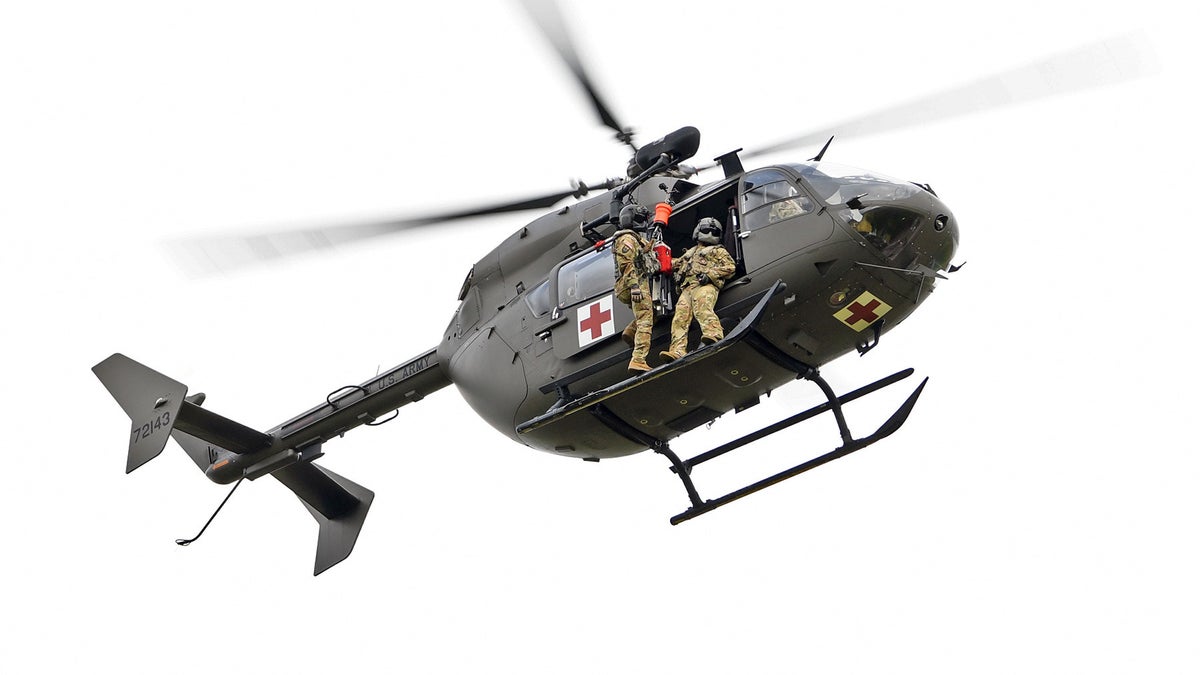Suicide among active-duty U.S. military members is comparable with the rate of suicides among the U.S. adult population, a new Pentagon report highlights.
According to the Annual Suicide Report (ASR), some 498 active duty military members took their own lives in 2019, maintaining a trend of increased suicides among active military members from 2014 to 2019.
The report, released Thursday, also found that Reserve and National Guard suicide rates “did not show evidence of an increase or decrease over the same time period.”
"Suicide is a national public health problem from which the Army is not immune. People First is our philosophy," Secretary of the Army Ryan D. McCarthy and Chief of Staff of the Army Gen. James C. McConville said in a joint statement on Thursday. "There is no single explanation for suicide, but the loss of even one Soldier to suicide is too great. We will continue to look hard at ways we can promote a culture of resilience and increase help-seeking behaviors."
SUICIDAL THOUGHTS IN US ADULTS NEARLY DOUBLED IN JUNE, CDC SAYS
As part of a comprehensive Trump administration initiative to dramatically reduce active duty and veteran suicides rates, in October 2018, the Defense Department established a requirement for a DoD Annual Suicide Report (ASR) to "serve as the official source of annual suicide counts and unadjusted rates for DoD and a means by which to increase transparency and accountability for DoD efforts toward the prevention of suicide."

A member of the National Guard patrols the section of a downtown, after a grand jury voted to indict one of three white police officers for wanton endangerment in the death of Breonna Taylor, who was shot dead by police in her apartment, in Louisville, Kentucky, U.S. September 23, 2020. REUTERS/Carlos Barria
As part of a comprehensive Trump administration initiative to dramatically reduce active duty and veteran suicides rates, in October 2018, the Defense Department established a requirement for a DoD Annual Suicide Report (ASR) to "serve as the official source of annual suicide counts and unadjusted rates for DoD and a means by which to increase transparency and accountability for DoD efforts toward the prevention of suicide."
Experts believe that with more thorough data to work with, they will be able to better design and tailor more beneficial prevention plans.
In this year’s report, the DoD found that military suicide rates are comparable with the U.S. population – after accounting for age and sex – for Active Component and National Guard, while lower for the Reserve.
The findings also underscored that "suicide rates for military spouses and dependents in 2018 were statistically consistent with 2017, and were comparable or lower than U.S. population rates after accounting for age and sex, with the exception of male spouses.
The numbers released last week by the Pentagon show that the National Guard saw a fall in suicides last year, from 136 down to 89, for a rate of 30.8-per-100,000 to 20.3-per-100,000.
But at the same time, the active-duty aspect rose from 324 to 340 suicides, a 1% increase, from 24.9-per-100,000 to 25.9-per-100,000. Moreover, the Reserve component experienced a decline from 81 to 65 suicides, 22.9-per-100,000 to 18.2-per-100,000.
While the data conclusions drawn over the past year don't show a significant spike, the DoD stressed that it remains a cause for concern given that it isn't going in "the desired direction" – which is ultimately an overall decline in all branches.
The statistics from what has already been a tumultuous 2020 won't be available until a year from now – and given the stresses brought on by the coronavirus pandemic – predictions are already slated as a cause for steep concern.
"The Army is committed to identifying and providing services and support to our teammates who may become vulnerable," McCarthy and McConville stated. "In the face of the additional stress of a pandemic, we are working to improve access to behavioral health care while enhancing our resilience training and stigma reduction efforts."
In particular, the U.S. National Guard has come under extra strain, igniting concerns for the gains made in decreasing the numbers from 2018 to 2019.

Louisiana National Guardsmen from Delta Company, 2-151st Aviation Regiment conduct recertification training on a LUH-72 Lakota helicopter hoist system used for rescue operations at the Hammond Regional Airport ahead of Hurricane Laura, Aug. 25, 2020. Guardsmen continue to prepare to respond to the citizens of Louisiana prior to landfall of Hurricane Laura. (U.S. Air National Guard photo by Master Sgt. Toby Valadie)
From quelling unprecedented wildfires to serving as a bulwark in raging riots, to scooping up countless victims from their homes amid the coronavirus pandemic, 2020 has proven to be a heavy – and multi-faceted – mixture of missions for many Guard troops, of which over 70,000 were activated to respond to the coronavirus pandemic alone.
Col. Michael Hudson (USMC-ret.), senior director of analytic behavioral risk management firm ClearForce, said the coronavirus crisis has introduced a whole new host of stressors to just about everyone in America, and these put Army National Guard members – especially those that were already struggling pre-pandemic – at an increased risk.
"In addition to worrying about the health and wellness of their friends and family, National Guard members are actively serving on the front lines, risking their health to operate COVID-19 recovery centers, and their safety during rescue missions related to this year's natural disasters," he told Fox News. "And perhaps most challenging of all is that they're asked to police their fellow citizens who are participating in the recent widespread protests. The cognitive dissonance of clashing with their fellow citizens is a heavy burden to bear."
Unemployment or underemployment challenges also have an impact.
"The additive pressure of financial stress coupled with activation issues and the pressure of being thrust into policing the street, supporting natural disasters or man-made chaos – looting and rioting – all have them experiencing emotionally draining situations," he noted.
The Guard hit headlines following the release of the report last year, which – based on the 2018 calendar year – indicated that the Guard's suicide numbers were not only higher than other services and reserve elements but had surpassed the general U.S. population in the same age category.
"The National Guard is in a challenging situation – living with one foot in the civilian world and one in the military world. Both of those worlds are experiencing significant increases in suicide, so it makes sense that Guard would see commensurate increases," explained Ken Falke, a Navy veteran, mental health advocate, and founder of Boulder Crest Retreat Arizona and the Boulder Crest Institute, the nation's first privately funded wellness center dedicated exclusively to combat veterans and their families. "Life in the Guard is challenging and compressing – whereby an active-duty soldier has 250 days to complete requisite training, a Guardsman is limited to 39 days to accomplish something similar, while simultaneously holding a civilian job and taking care of family responsibilities."
And according to Dr. Roger McIntyre, CEO of AltMed, and the director and co-chair of the Scientific Advisory Board of the Depression and Bipolar Support Alliance (DBSA), unfurling the stigma still attached to mental health – especially within the military – is critical in combating suicide.
"What hasn't worked has been silence or pretending that it's not a problem or ignoring that it exists. Openness, education, and psychiatric aid that is confidential and non-judgmental are what can and will help the most," he stressed. "There are broad-ranging approaches that can help people alleviate their suffering from medication to therapy."
MILITARY LEADERS SAY ACTIVE-DUTY SUICIDES UP 20% DURING COVID-19 PANDEMIC
While it is impossible to ascertain data sets on just how many suicides have been stopped as a result of more refined programs and mechanisms to aid those in need, the DoD is confident that it has "made progress in developing and fielding programs targeting the populations of greatest concern identified in the 2018 ASR findings – young and enlisted members and National Guard members – as well as supporting our military families."
Example actions taken include increasing skills for young and enlisted service members, developing and initiating pilot of an interactive educational program to teach foundational skills to deal with life stressors early in military careers, developing video training for service members on how to recognize and respond to suicide warning signs on social media, and enhanced counseling access for Guard members and their families in partnership with the Department of Veterans Affairs.

Wisconsin Gov. Tony Evers has summoned the National Guard to head off another round of violent protests after the police shooting of a Black man under murky circumstances turned Kenosha into the nation’s latest flashpoint city in a summer of racial unrest (Sean Krajacic/Kenosha News via AP)
"The initiative, which began in 2019, has seen an increase in National Guard members receiving services during drill weekends (14%) and at RCS Vet Center locations (44%), compared to last year," the report noted.
McCarthy and McConville also pointed to the "This is My Squad" initiative, which is centered on directing leaders to focus on developing deep inter-personnel connections at the lowest levels, so they better know their teammates.
CLICK HERE TO GET THE FOX NEWS APP
Essentially, each individual Soldier or Army Civilian has a teammate, a family, and a leader. By establishing a connection between these key individuals in their lives, a "Golden Triangle" is formed.
"If those connections exist, someone in the triangle will likely know if one of our teammates is struggling," the leaders explained. "We need every member of the team engaged. These initiatives are integral to our efforts to equip leaders at all levels with creative, effective tools for building resilient, cohesive teams."
The National Suicide Prevention Lifeline toll-free number is 1-800-273-TALK (8255) and will connect the caller to a certified crisis center near where the call is placed and is available 24 hours a day. Confidential help is available for soldiers, veterans, and their families through the Military Crisis Line at 1-800-273-8255, option 1, or by texting 838255.


